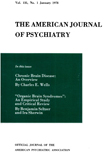THE TREATMENT OF CHRONIC ALCOHOLICS WITH CITRATED CALCIUM CARBIMIDE (TEMPOSIL)
Abstract
The lack of side-effects and the absence of severe cardiovascular response during a Temposil-alcohol reaction, increase the desirability of treating the alcoholic by interfering with the metabolism of the alcohol. Although this drug is rapidly excreted, there would seem to be question as to whether the patient who decides to drink will be deterred by having to wait a few days longer to start, if he is taking disulfiram rather than Temposil.
Some observers have not regarded the reactions, when the patient taking Temposil drinks, as being sufficiently severe. However, there would seem to be little correlation between the discomfort the patient experiences and the maintenance of sobriety. The methods of treatment which interfere with the metabolism of alcohol are applicable only to the alcoholic who wants help in abstaining, and Temposil seemingly offers this help with the least discomfort–to patient and physician.
Access content
To read the fulltext, please use one of the options below to sign in or purchase access.- Personal login
- Institutional Login
- Sign in via OpenAthens
- Register for access
-
Please login/register if you wish to pair your device and check access availability.
Not a subscriber?
PsychiatryOnline subscription options offer access to the DSM-5 library, books, journals, CME, and patient resources. This all-in-one virtual library provides psychiatrists and mental health professionals with key resources for diagnosis, treatment, research, and professional development.
Need more help? PsychiatryOnline Customer Service may be reached by emailing [email protected] or by calling 800-368-5777 (in the U.S.) or 703-907-7322 (outside the U.S.).



